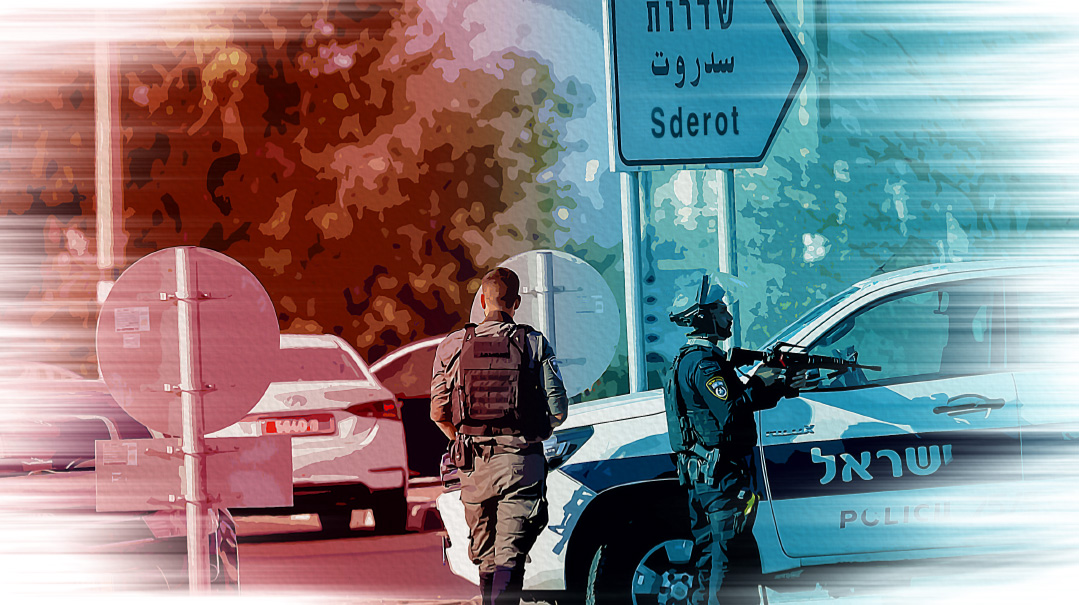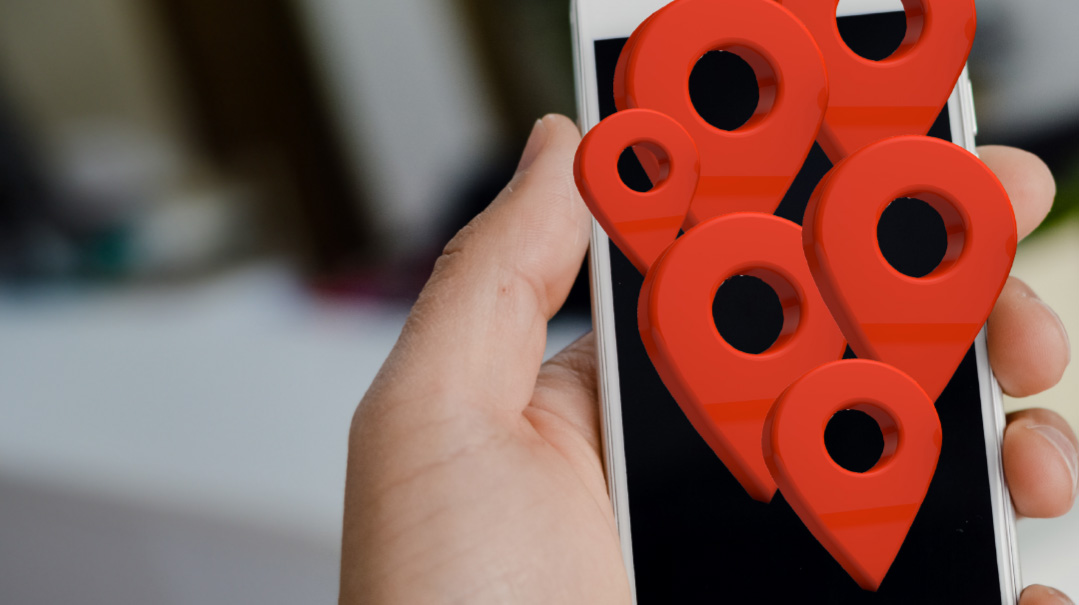Homesick
| April 30, 2024I wish I could say I was excited to go back, and that our return home was smooth. But I wasn’t, and it wasn’t

As told to Mindel Kassorla by Keren Elkobi
I
t’s surreal. We’re finally back home. And yes, Sderot is home… even if we can hear gunshots and explosions from Gaza.
People wonder why we planted our family (I’m from Baltimore; my husband was raised in Be’er Sheva) in what seems to them like a war zone. I’m not saying we never questioned our decision; of course we’ve thought about moving. But at the end of the day, Sderot is where my husband was learning and we love the community. A whole bunch of young couples — the moms hang out in the park, the kids are all friends, like one big family — that’s what keeps us rooted here.
Over the seven years we’ve been living here, we’ve definitely had our share of… scares. “Mini” wars, some tension, waves of rockets. When the siren goes off, we have ten to 15 seconds to find shelter. We usually hear the Iron Dome interception within three to five seconds, and our house shakes from the blast. Heavy periods of rockets left us virtually chained indoors, and when that happened, we’d usually leave Sderot for a few days till things settled.
Until, of course, October 7. We woke up at 6:30 a.m. to sirens and explosions. The kids’ room is actually the shelter, and my husband and I joined them inside and waited for it to stop.
But it didn’t.
Something was “off.” We were hearing explosions and we could tell they were not all getting intercepted. We already know how it sounds, and this was different.
As part of his rabbinic position in the security forces, my husband keeps his phone on in the closet over Shabbos. Now we heard ringing and assumed he was being called in. Instead, we saw the name of his sister from Be’er Sheva show up on the Caller ID. We knew something was very wrong if she was calling on Shabbos.
My husband used the phone with a shinui, and his sister was hysterical. “There are terrorists in Sderot who took over the Police Station! Stay put!”
The rockets weren’t stopping, and they were later joined by gunshots and the sound of tanks. People were screaming in Arabic right outside our building. Locked in the shelter all day, we had no Yom Tov meals, no hakafos. I don’t even think we got out of our pajamas.
Only after Simchas Torah did the picture come into full focus. Terrified, we slept with our kids that night in the shelter (though my husband and I actually slept very little). By morning, there were still crazy waves of rockets, and we knew there were active terrorists waiting outside. Gunshots pierced the air anytime someone dared leave their home.
The city was closed off and we were warned not to leave our houses. Then we heard from a friend that one of the only three exits of the city was open.
“It’s now or never,” my husband said. We stuffed some things in a bag, and when my husband went to the car, a siren caught him outside. I was left inside with the kids, panicking. He rushed back and said now was our best chance — we would have at least another few minutes before another siren would go off. My heart was racing as I put the two older children in a more protected area of the car — between my feet on the front seat, and I held the baby on my lap. My husband drove like a maniac out of Sderot, doing 110 mph. After driving for 20 minutes straight, we finally felt safe enough to stop, buckle everyone in, and drive to Petach Tikvah.
IN Petach Tikvah we stayed in an empty girls’ dorm building — the students weren’t allowed back in yet. It wasn’t five-star, but we were comfortable — each room had its own shower and bathroom, so we had our privacy. We had washing machines, the community was sending us meals, and we adults were in too much shock to think about anything long-term.
We were helpless, dependent on others for everything — from food to toiletries to clothing to a pack ’n play for my baby — and it was a pretty bad feeling. Due to the heavy rocket fire, most stores were closed. Only stores selling basic necessities were open, and then only for a few hours at a time. Even if we had the desire or strength to help ourselves, we couldn’t. Nobody cooked; the adults had no appetite and the children were living on mostly simple sandwiches. We were sent pizza for dinner so often that at a certain point my kids begged us, “No more pizza!”
We spent our days outside in the sun. We couldn't keep the kids cooped up indoors, but there wasn’t anywhere to go or much to do. None of the adults were talking to each other — we were too traumatized to make conversation. But the Petach Tikvah community was an incredible help — they brought dogs for the children to pet, as a kind of animal therapy, and moon bounces with waterslides to entertain and cool everyone off. We were so grateful.
After two weeks, the government announced a change in status: places like Petach Tikvah, which had sufficient time to reach shelter before rockets hit, were permitted to reopen schools. Which meant we were being kicked out of the dorm and needed to find a new safe place. It became clear that this was not going to be a temporary situation, and we were yanked out of our denial and depression. Facing our new tough reality helped us prepare for the long haul ahead.
It was really important to us and the other families we’d been staying with to find a place where we could keep the feeling of community we’d built so far. We were all on the same page in our religious lifestyles, which was very stabilizing for the kids. But it wasn’t like anyone was going around taking a survey about our preferences. My friend’s husband became our advocate and he eventually found Beit Meir, a religious moshav in central Israel with breathtaking views. We got funding for our accommodations and eventually for proper meals as well — goodbye sandwiches!
When the staff first showed us our living space, I was horrified. “I’d rather live in a girls’ dorm with the girls there!” I told my husband. They were able to switch us to a better room, which had three bunk beds and a crib — but barely enough room for anything else. On the bright side… these rooms actually had locks on the doors. A step up from our Petach Tikvah accommodations.
Living in an area smaller than my living room was hard enough for me, but it was taking an even greater toll on the kids. They needed their personal space, but there was none. We were stepping on each other’s toes — literally — all the time.
And it wasn’t only the lack of space. These kids had been through so much, but lacked adults’ ability to speak about and process it. They’re smart enough to know what’s going on, but have no idea what to do with the information. We could see the effects most in my oldest son, who was six. While he’d never hit or yelled in the past, he became aggressive and difficult. He was never calm and had emotional reactions to situations he used to handle so well. The other mothers reported the same experience.
People outside of Beit Meir suggested we request to switch to a hotel where the rooms were nicer. But here we had the beautiful outdoors instead of being smack on the street, along with a gated entrance for increased safety and security. And most of all, we had like-minded friends, the feeling of community.
Shabbos in Beit Meir was also a big plus over the other hotels: They scheduled proper Shabbos meals, not just breakfast, lunch and dinner like a regular weekday. Instead of buffet style, they hired waiters to serve us at each table and give it a nice Shabbosdig feel. Each week, we tried to bring in one of the rabbanim from Sderot for an extra dose of chizuk and inspiration. They would come with their families, give shiurim, and boost our spiritual morale.
The atmosphere of Beit Meir and its natural beauty were calming and therapeutic. While Beit Meir usually hosts big youth groups on tiyulim, they worked their schedule around us and limited their intake. Israeli youth and American teens visited with activities for both kids and moms. I can’t stress enough how important it was for us moms to keep the kids busy and give us a chance to relax.
Back in Petach Tikvah, I was getting in two hours of work a day. But once we got to Beit Meir, my boss called and told me she needed more hours — or I’d have to go on unpaid leave. Sitting by the computer, where I worked in social media marketing and web development, was a welcome break that helped keep me grounded, instead of just sitting around talking about “the situation.” There were also activities for women at night that were a great outlet. We had ceramic tile projects, embroidery, karaoke nights, macramé, and dance parties that we loved so much, we sometimes sat there until two a.m.
AT first, we thought we’d be home before Chanukah. But then we were lighting the first candle… and then the eighth. We realized that this wouldn’t be ending anytime soon, and we needed to make the best of it. We set up a makeshift preschool system from ten a.m. to one p.m. Several of the parents were teachers, so we thought it would work, but it turned out to be a disaster because the older kids were totally unstimulated. Still, it was better than nothing. We needed to keep the kids busy and give their days structure; when we didn’t, they spent their days running through the lobby destroying things, and worse — talking about terrorists and explosions.
In late January, things shifted as the government gradually removed the financial backing for evacuees. At first, we were given the option to receive subsidies that would help cover a furnished apartment rental, but I knew that wouldn't work for us. As it was, my husband was traveling at least two hours each way to work every day. This left me alone most of the time, and my only support system was the group of mothers who had husbands commuting or serving. I didn’t want to give that up. And besides, a new place would mean a longer commute.
Mid-February, the government announced that we could stay where we were until the end of the school year — but the next day, they clarified that “temporary” schools would no longer be funded. What would we do with the kids? I work full-time. We tried hiring a morah privately, but it wasn’t a long-term solution. My husband was begging me to move further down south where he could get back from work earlier to help me. Ultimately, it came down to the fact that we had a home and a community in Sderot. We belonged there.
I wish I could say I was excited to go back, and that our return home was smooth. But I wasn’t, and it wasn’t. One Shabbos afternoon in the park, I heard gunshots. The day after Purim, we heard there’d been a terrorist infiltration; later we found out that the terrorists hadn’t actually come through the gate — but they’d tried.
Our everyday background noise includes blasts that shake the house like earthquakes, helicopters, AIF planes, gunshots, and tank explosions. Many stores have not yet opened or are open for fewer hours.
It's not easy driving the streets where people we knew were murdered by Hamas. And then there’s the constant fear of a rocket or another terrorist infiltration. I still don't buckle up my older kids when we drive, "just in case," because there isn’t enough time to unbuckle and get to safety.
Honestly, I’m still processing it all. It feels like we were just sitting in our succahs (there are still a few up in Sderot!), and as I write this, it’s almost Pesach. We left our houses, found temporary ones, and came back home… all while we await the day that we will truly be home, the way it should be.
(Originally featured in Family First, Issue 891)
Oops! We could not locate your form.







